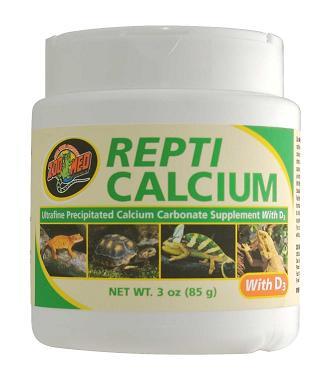
If you’re already a herp owner, you probably find yourself sprinkling calcium powder on crickets, cockroaches, or veggies every so often. Do you ever occasionally wonder if it’s really necessary? Well, it is. And this article tells you exactly why your reptile needs extra calcium.
First, the exception
Before you delve too deeply into this information, ask yourself a couple questions. Do you own only snakes? Do you plan to acquire snakes in the future? If your answers are yes, then you may not need the information here. That’s because snakes do not require calcium powder added to their food.
Snakes already get enough calcium from the food they eat. Their prey contains an endoskeleton, which has enough calcium to meet your snake’s nutritional needs. Basically, the bones of the prey provide what your snake needs for its bones to be healthy, as well as providing calcium for forming eggs in females.
Still reading?
If you read the exception and you are still interested in why most other reptiles and amphibians require calcium supplementation, then here’s your answer. For most exotic pet species, it is extremely difficult for owners to replicate their wild diets. In the wild, your pet would get everything it needs. But a terrarium will never be exactly like a native habitat, and a domesticated diet, even one based on natural eating patterns, cannot exactly replicate the diet of the native habitat in most cases.
There have been documented cases of captive reptiles and amphibians developing MBD (metabolic bone disease). So we know that they require calcium to keep their bones healthy and for other health reasons, such as proper nerve function and hormonal balance. The truth is that we don’t know exactly what every species eats in the wild in detail. We don’t know exactly what their nutrition needs are. Another factor is that the whole food chain is different in a captive setting. The crickets your bearded dragon would eat in the wild likely have a much higher nutritional content from the items in their gut than captive-bred crickets. And we don’t know what other factors may contribute to the bone health of herps, such as levels of sunlight and exercise.
But supplementing your exotic pet’s food with calcium powder is a known why to prevent serious health issues. Depending upon the age of your pet, metabolic bone disease can present in various ways. It can cripple your pet, hindering its ability to move, and it can even be fatal in advanced cases.
Of course, you may have noticed that there is little specific research about how much calcium supplementation specific species require, and the calcium powder containers have contradictory dosages from brand to brand. Your best bet is to sprinkle some calcium powder onto food at each feeding, but try not to go overboard with it. As long as your reptile or amphibian is getting some calcium each time it eats, it should be absorbing enough over the long term. Remember that there can be too much of a good thing, and providing too much calcium supplementation can also throw off your pet’s health.
To get a demonstration of applying calcium powder to food, stop by The Tye-Dyed Iguana, or send us a message for more information.
